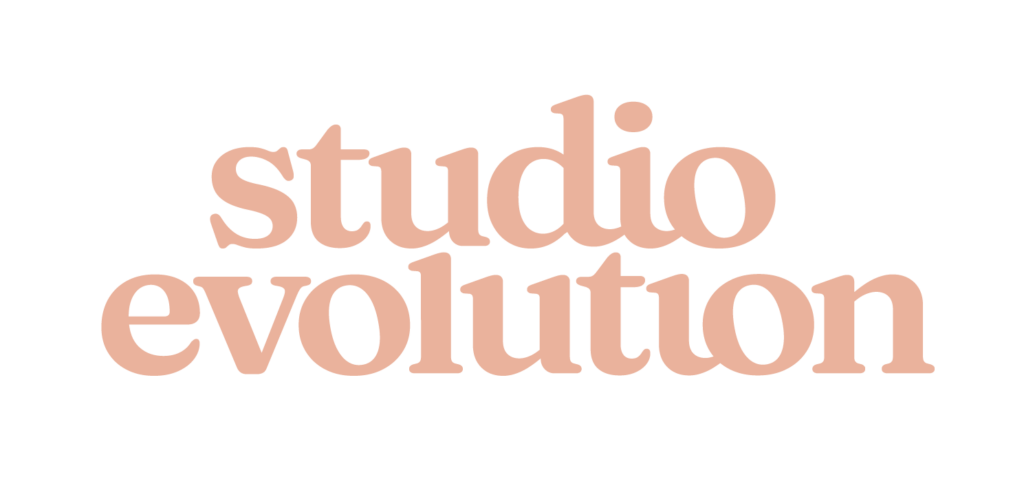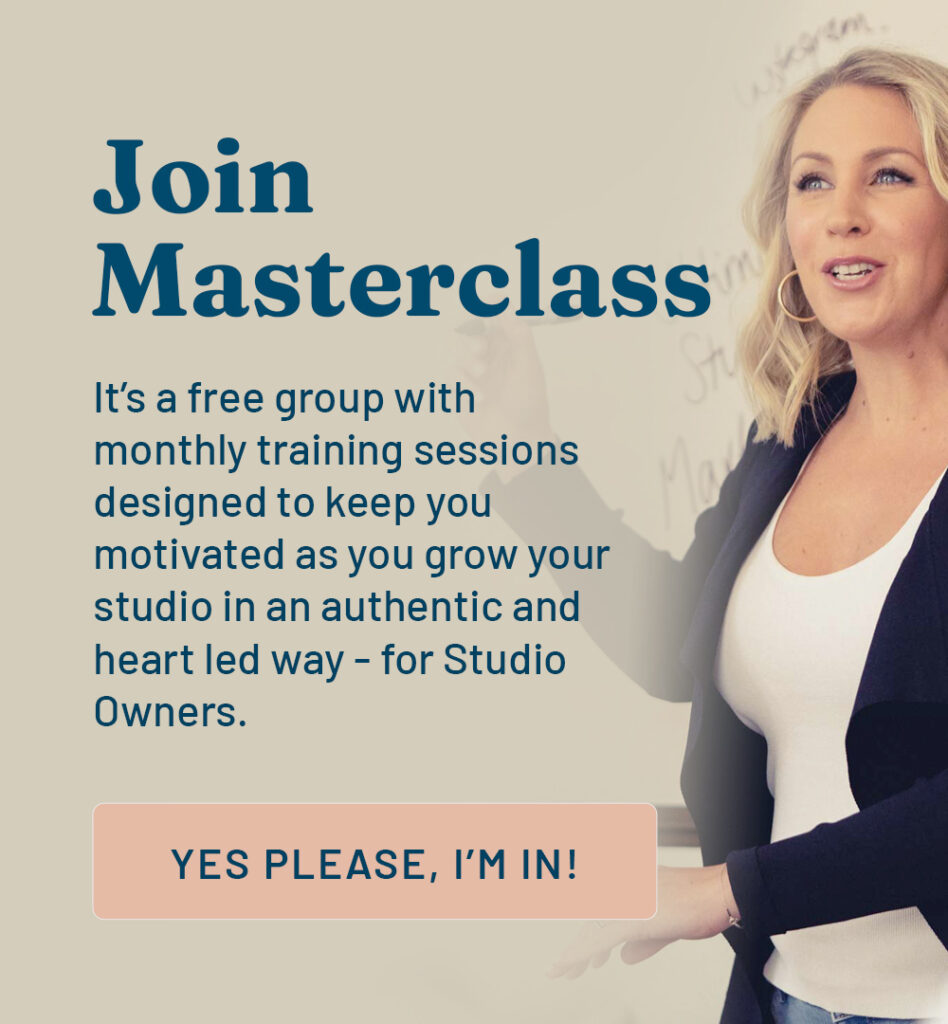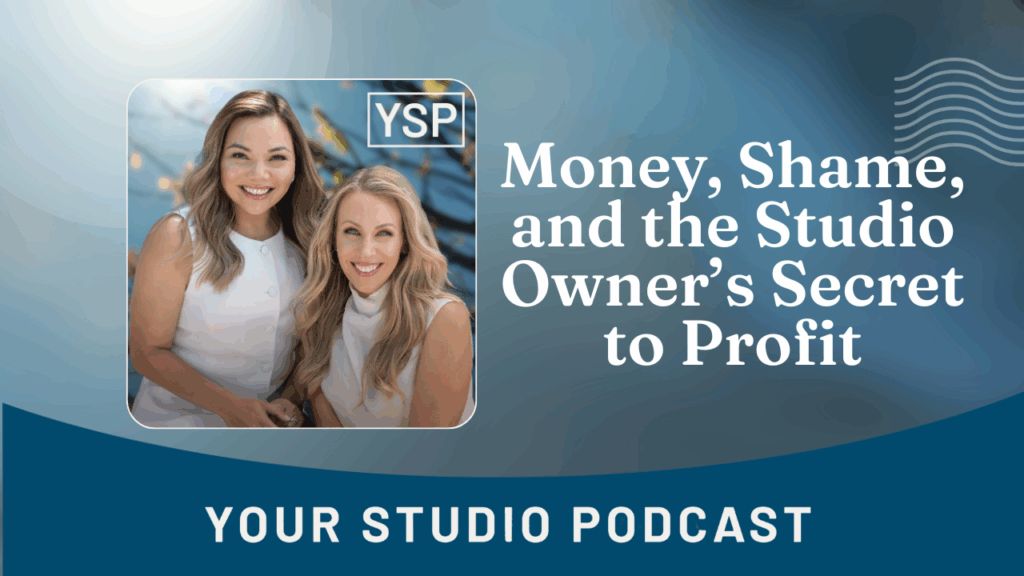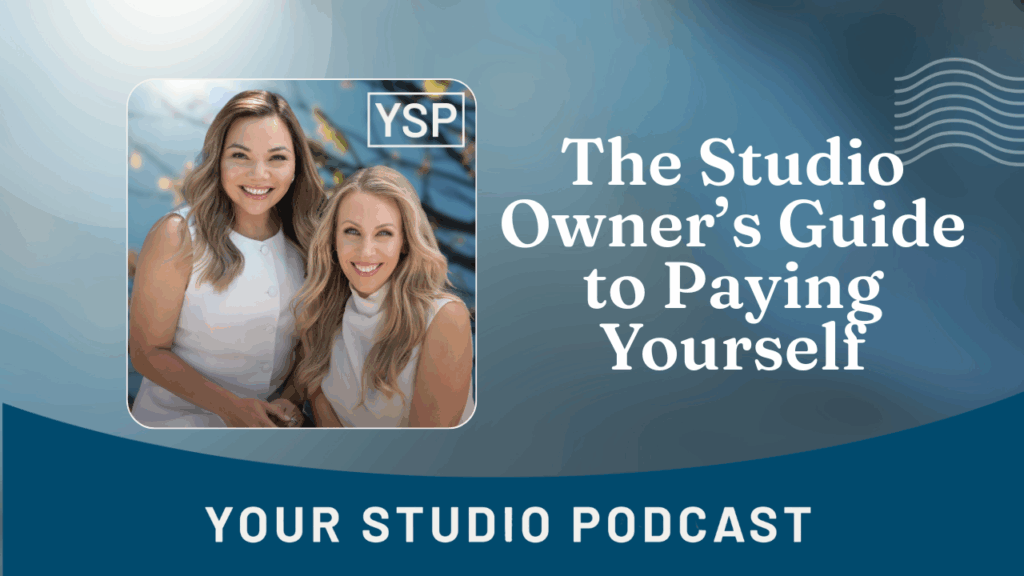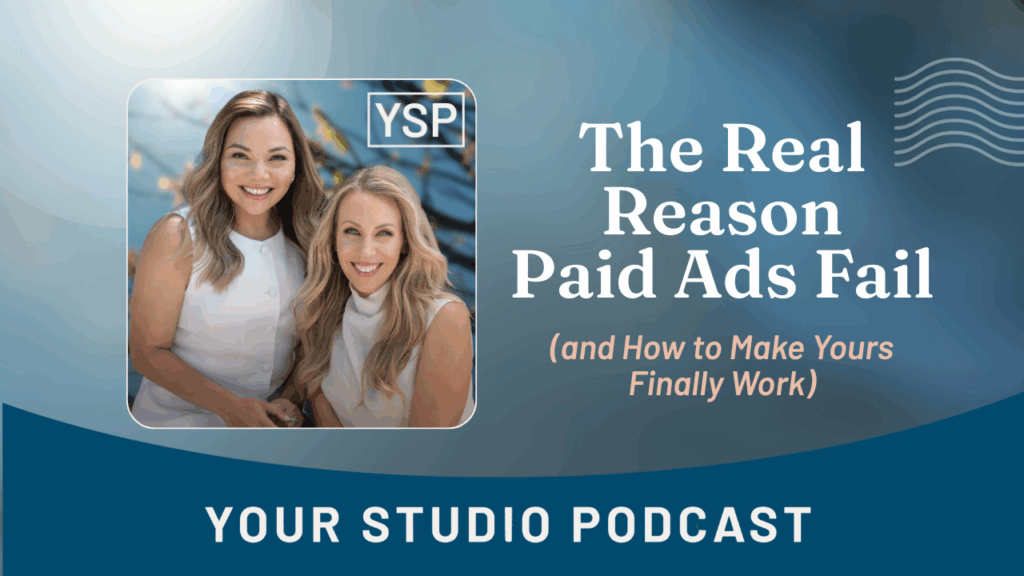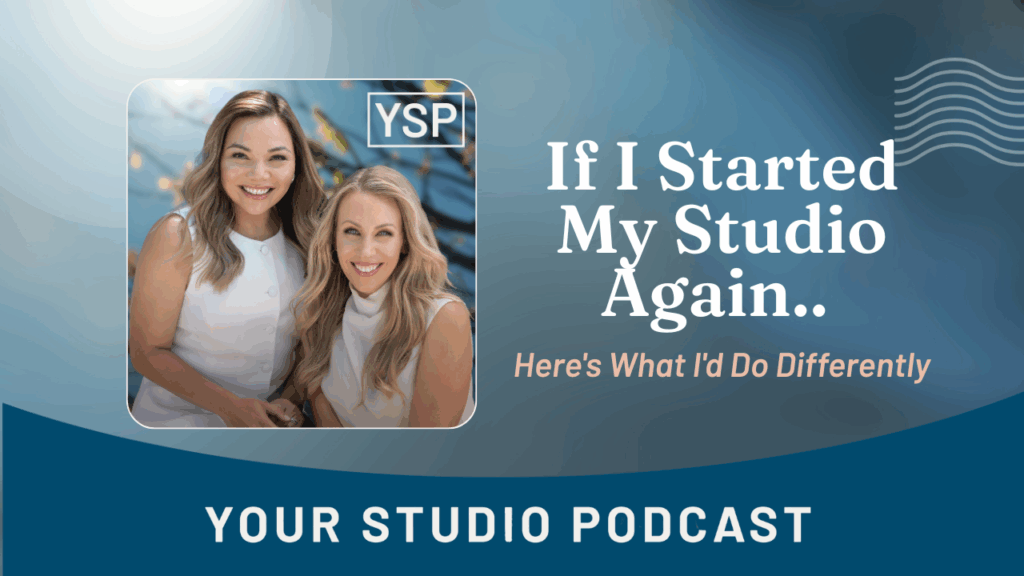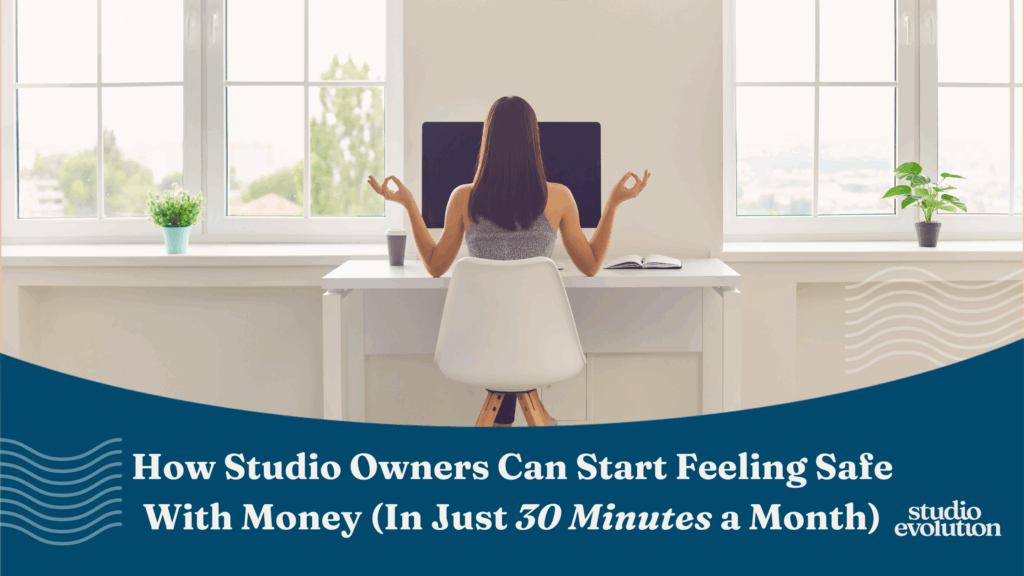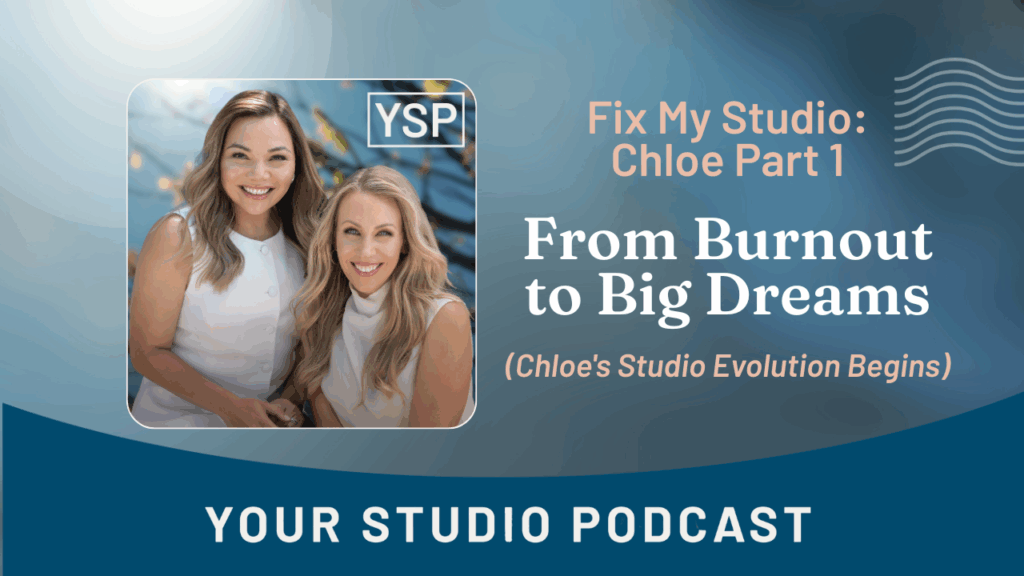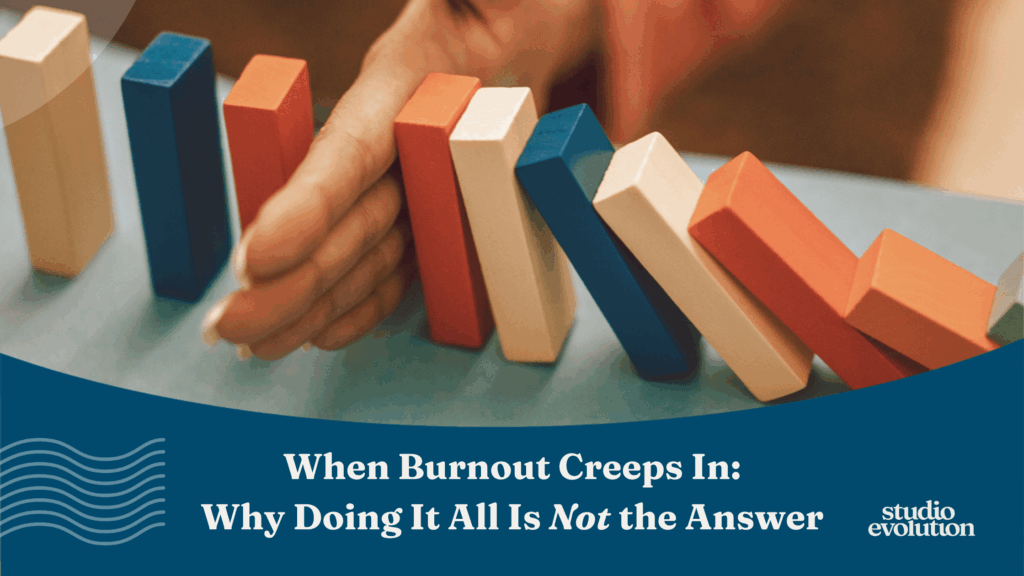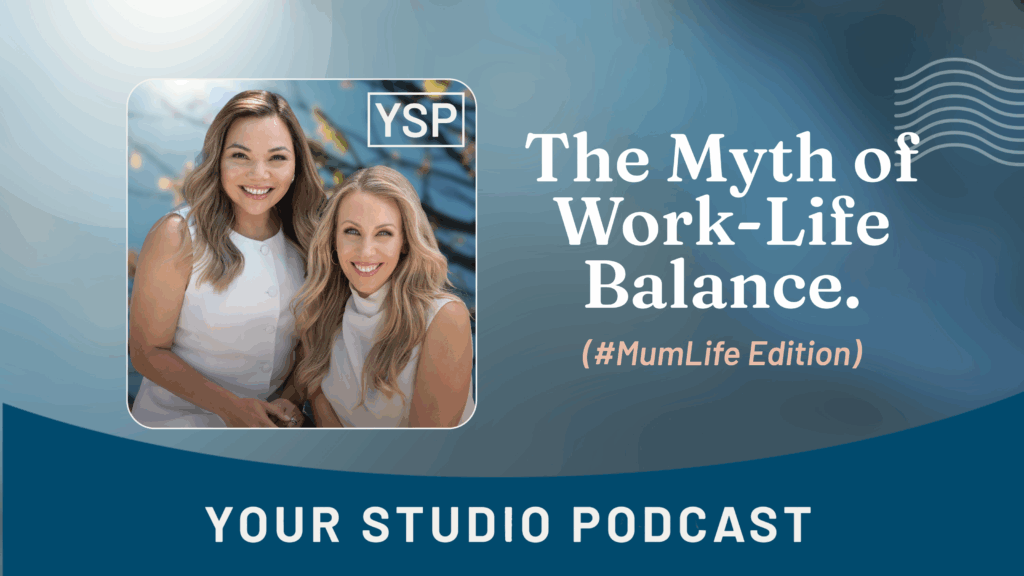Pricing can feel overwhelming, but it doesn’t have to be. In this episode, Chantelle and Michelle break down The 3 Golden Rules of Studio Pricing—simple, strategic shifts that will make your business more profitable, sustainable, and stress-free.
Whether you’re unsure about raising your rates or looking for a pricing model that truly supports your studio’s growth, this conversation will give you the clarity and confidence to move forward.
Additionally, if you want to work on your pricing IN PERSON with Chantelle and Michelle – you have to come to our Elevate: Studio Profit Intensive, 2-4 April in Sutton Forest NSW. Tickets are extremely limited. Get yours at studioevolution.com/elevate
Please make sure to subscribe and review if you like what you hear!
If you’ve got a studio problem you’d like us to solve, leave us a voicemail here: https://www.speakpipe.com/LeaveEvolutionAVoicemail
Be sure to follow us for more content perfect for Studio Owners!
Instagram: @thestudioevolution
YouTube: @thestudioevolution
Facebook: @TheStudioEvolution
And if you’d like some more support, find out how we could help you here:
Website: studioevolution.com/start
Michelle Hunter (00:48)
we’re the yin and the yang. This is why we work so well together.
Chantelle Bruinsma (00:51)
why we’re
Michelle Hunter (00:52)
I thought of you the other day, something happened and I was trying to get, yeah. was telling Mitch about the paint. I’m going to a paint and sip on Friday night. Yeah. It was so much fun. But Mitch said, I’m surprised that you, that you lasted that long. I was like, no, it was actually quite funny. It was like halfway through. was just, Chantelle could just feel me looking at her. I was like, it’s like focus on the horizon. Remember she’s like focus on the moon line or something. And I’ve done, I’d be like done. And like everyone was like.
Chantelle Bruinsma (01:01)
yeah, I remember when we did that, that was fun.
huh.
Michelle Hunter (01:22)
I was like, come on, she’s already said the next step. I’m waiting for the next step. What’s the next step?
Chantelle Bruinsma (01:26)
You will learn so much about your team by doing Paint & Sip together, won’t you? Won’t you ever?
And then there’s me like going to the very last minute, like, no, I just need to be perfect.
Michelle Hunter (01:34)
everyone’s like, Michelle, do you want an extra painting? yeah, sure. I would love the same painting six different ways, team. That’s exactly how I want to decorate my house right now.
Chantelle Bruinsma (01:41)
painted by
by six very inadequate artists.
Michelle Hunter (01:47)
Hi everyone. Welcome back to the Your Studio Podcast with Michelle Hunter and Chantelle Bruinsma And it is a big day. We’ve come to the end of season two.
Chantelle Bruinsma (01:57)
Woo, wow, wow, wow, wow, wow. my gosh, friend, what a joy. Too much fun.
Michelle Hunter (02:02)
We’ve had so, so much fun. And today we are diving into a question, which I think is probably one of the hottest topics we get questions about all the time, every in-person kind of training. This one never fails to get a rise out of all the studio owners. And even if you you’ve done it, there’s some tweaking that can be done. And that is pricing.
Chantelle Bruinsma (02:27)
Got my magic sharpie ready. Like.
Michelle Hunter (02:28)
Yeah,
Chantelle is ready and she’s ready to slash and yeah, that’s right.
Chantelle Bruinsma (02:33)
All I need is a whiteboard right now or a giant
post-it note, because this is one of my freaking favorite things to dive into, like sorting out your pricing and getting really clear is one of the most transformational things we can do in your business. And it’s also one of the most terrifying for people. we did, I remember we were at retreat one of our gorgeous clients, Pam, she runs a Pilates studio and she came up and she was trying to just re-do the membership model for her business and just.
Michelle Hunter (02:53)
Aw, love her.
Chantelle Bruinsma (02:59)
She was about to do it, was like, I just want to make sure it’s really, really good. And she got up to the front of the room and we wrote it down and I was like, hun, we can play here. And I got out my magic Sharpie and started really just like, we don’t need that. We don’t need that. And you get to see her face like quietly dying. She did, she did. She was slightly concerned and overwhelmed. But then we walked through it and I was like,
Michelle Hunter (03:16)
She just started to retract into her body.
Chantelle Bruinsma (03:28)
this is what it could look like. And she did this moment where she just went like, she put her hands on either side of her cheeks and just went like, my gosh, like magic, magic. And then she’s gone and done it. She’s gone and rolled out this absolutely refined model. today what I wanna share with you are Chantelle and Michelle’s three golden rules of pricing. And we are excited to walk this through with you. If you’re considering.
Michelle Hunter (03:30)
Mmm.
She did.
Yes.
Chantelle Bruinsma (03:56)
changing your pricing model, this is a must listen to episode. So we are glad you’re here. And of course, if you have not yet to subscribed to like the pod, please make sure you never ever miss an episode. We really appreciate you doing that right now. So that you get fed all of the studio gold that we have to offer you. So Michelle pricing, you ready?
Michelle Hunter (04:15)
That’s right. Pricing.
Yeah, let’s dive in. And before we roll up our sleeves and get into it, this is truly one of Chantelle’s superpowers. If you are in the room and can get, you know, Chantelle to, you know, review your pricing, it is really one of her superpowers. And also before we go into this process, I like to say like, let’s just try it on. All right. Like there’s a lot of fear in this and we do pricing. If we’re changing any kind of pricing model in our businesses, on our website.
Chantelle Bruinsma (04:42)
Yeah, genuine.
Michelle Hunter (04:44)
Let’s just go through this process and see what it feels like. Chantelle, I’m hearing your voice when we’re talking to studio owners as they’re hyperventilating. Let’s just see. You’re going to be okay. And let’s just try it on. So Chantelle, let’s dive into the first golden rule of pricing. And you know, we say this a lot. I’ve actually said this a lot this season, but a confused mind says no.
Chantelle Bruinsma (04:51)
Lot of reassurance, you’re going to be okay. It’s…
A confused mind says no. So rule number one of Chantelle and Michelle’s three golden rules of pricing is your pricing’s too complicated. I don’t know if that’s a rule or if it’s just a statement of fact, but what we see across the board in every, every industry of studio business is the complexity of pricing. Now I want you to imagine that you are in the market to join a new studio for yourself.
and you go to a website and you see, that looks like a lovely class, that’s kind what I’m going, looking for. And you see kind of the program, yeah I wanna do that particular program and then you have to go to the pricing page and then you have to like, okay well so like 15 minutes is this amount, 30 minutes is this amount, 45 minutes is this, 60 minutes is this, 75 minutes is this, 90 minutes is this, but if I’m doing two classes a week it’s this, if it’s three classes plus I wanna do that as well, it’s gonna be this, if I want unlimited this, it’s gonna be, if I wanna add on that, it’s gonna be this, this and this and this, this.
and people go to your pricing page and they have to have a degree in higher mathematics to work it out. Honest to God, honest to God, Michelle, right?
Michelle Hunter (06:16)
Yep.
That’s when there are the mental load of thinking and decision-making in that moment. That’s where you can just lose them.
Chantelle Bruinsma (06:25)
So I’ll give you a recent example for me. So my beloved Pilates instructor, Meher, my bestie, she had some surgery and I had to find somewhere else to do Pilates for eight weeks. So I’m looking around all the studios, right? It’s quite a fun little experiment for me, I love it. Anyway, so I’m researching all the different websites and I found the one that I love and I went to a class, I loved it, loved the studio. Honestly, I was like, I might actually just pick up an extra class a week because I really enjoy going there. Their pricing model, I do this for a living.
I couldn’t work it out. I couldn’t find the best option that was right for me. And I was like, that’s horrible because I am someone who is, I’m ready here, take my money. And the pricing was what kept me from coming in the door. Isn’t that shit? That the pricing model was so complicated, it turned me off.
Michelle Hunter (07:06)
Yep. Yep.
Yep.
It’s just like another barrier to entry, right? It’s just like another barrier of them just making the enrollment a seamless and easy process.
Chantelle Bruinsma (07:25)
my gosh, it’s so the cognitive load you’re asking people to do and to think when they’ve got to kind of make, you know, a lot of decisions. It’s like that old analogy, like would you write red wine or white wine? It’s like asking your toddler, you don’t say, what would you like for dinner, darling? Would you like 15 different options? No, you say, would you like penne pasta or would you like a scrambled egg? Like it’s a very simple kind of choice. I mean, that’s my children’s two safe foods. So it’s a decision of like, how can I make this so clean?
Michelle Hunter (07:40)
Yeah. Yeah.
Chantelle Bruinsma (07:55)
so simple and reduce all the different options. I want it to be like three options ideally, right? So, you know, I even remember one of our Evolution clients, like they had 17 different lines of options that people have to sift through. It makes sense to you. I get that. And you’re kind of like trying to make it the best way is you’re doing it based on hours and minutes and kind of all that teachers more experienced so it probably should be, they should probably be charged more. If I’m the teacher, it probably should be charged more than if
Michelle Hunter (08:00)
Yep, max.
Chantelle Bruinsma (08:24)
a less experienced teacher or this one’s got machines or reformers so they probably need to be charging more than if it’s a mat class and like all the variants from a consumer perspective are polarizing and they are not attractive all they want and they’re happy to probably pay more for you to say this is it.
Michelle Hunter (08:41)
Yeah, that’s it. And the consumer is not necessarily looking at all the little variants, are they, Chantelle? Yeah.
Chantelle Bruinsma (08:47)
They don’t know them. They
don’t know them. Even I was doing this experiment with one of our clients last week and she was saying that, so every class, the costume is $90, except for this class. That class is $85. I said like, why, hun? Why is that class like, she said, well, that one tends to cost less. I’m like, they don’t know. They don’t know.
just charge everyone $90 and make it clean, less communication, right? You can make things so straightforward and so simple for people. The other thing I wanna say about that is, and this is a really important thing that is essential. It’s, I believe that, and this is something, if you want to make marketing easier for your business, I wanna encourage you to take The Leap with us. It’s a six-week online course and it revolutionizes your entire approach to marketing, right?
I can’t always say it, it happens. The course works, right? And in these six weeks, one of the things we do is we really focus on like getting people to go to your website and enroll. That’s the pathway I’m going to build out in six weeks with you, right? And one of things is like on your program pages, like on the pages that’s about the program of your studio, don’t give them all the types of pricing friends. Don’t give them, like don’t send them the whole pricing model for your whole studio. If they’re interested in the kind of the preschool value program, introduction to reformer,
Michelle Hunter (09:35)
That’s right, it works.
Chantelle Bruinsma (10:02)
you know, beginner yoga, dance for 14 year old students, just give them the pricing that they need. Don’t make them sift through everything, just like dilute it, just filter it down to just what they need to know. Your pricing is too complicated and it is turning people away. It is a marketing issue. Your pricing has actually become a marketing issue and we want to streamline it right back down. Three options, if you can.
Michelle Hunter (10:22)
100%.
And then also marketing issue. When you have a hundred options, it’s also an admin issue. That’s like 17 different payment plans, making sure that they’re up to date. When you actually like simplify it to three pricing options, that is so much more manageable for that, for your admin. And you’re not going to miss a failed payment. that’s when things start to fall through the cracks. When there’s more complexity, it really affects the backend as well.
Chantelle Bruinsma (10:30)
my god.
my gosh, particularly if you don’t have a bookkeeper, trying to stay on top of it is a nightmare. Nightmare. Honestly, it’s really hard. the rule of Chantelle and Michelle’s golden rule of pricing, number one, is to simplify, simplify, simplify. As much reduction like the minimal viable number of pricing on what’s at your can. Number two is that we’ve talked about this season already briefly. We wanna kinda double tap on this.
Michelle Hunter (10:50)
Yaaaa!
Yeah. Yeah.
Keep it simple, yeah.
Yep.
Chantelle Bruinsma (11:16)
This is where want to really recommend that you do an annual price rise. Every single year, we’re doing a price rise for your studio.
That every year that our clients, our students come to expect that there’s the prices are going to go up a little bit. The reason this is so important and critical is that if you don’t, like right now we’ve got this lovely studio owner in Evolution and she’s been running her business for only like two, two, three years.
So quite new and she’s never done a price rise and the woman is terrified about doing it. She’s terrified. She’s like, I’m okay for new people coming in the door, but my current students like, I can’t do it. And if you’ve never done one before, that fear is genuine. Like, are they going to all up and leave me and just abandon me because they don’t want to pay an extra dollar per class. It’s like, actually you’re gonna be fine.
Michelle Hunter (12:05)
you, and the perceived of like, it’s the perception I’m going to get 50 students pull out. You might get two emails. That’s the reality of it.
Chantelle Bruinsma (12:08)
Uh-huh.
That’s
right, like the pitchfork. People are going to come to my house with flaming pitchforks and hunt me down for raising my classes by $4 a week. It doesn’t happen.
Michelle Hunter (12:25)
And that’s the fear piece
that comes in. If you’re not doing it consistently, that that’s when that fear, you know, you wait years and years. That’s when that fear can come in and what the price increase also do. It gives you positioning, right? Chantelle like you want to be positioned in your area as the premier studio.
Chantelle Bruinsma (12:38)
Mm.
There is a relationship from a marketing perspective. The studios that do have higher price points, there is a natural perception that they are better quality, there’s better tuition, there’s better resources, better facilities. So if you were charging down bottom basement prices, there is going to be a natural correlation that you probably aren’t the best in the area. So again, it’s like that fear of like,
I don’t want to overcharge people, but there is a balance of really owning, no, we do offer great classes. We do, I want to be able to pay my team well. I want to be able to do all these fun things in the studio. That means you’ve got to charge at the top. And so, you know, from a rule of thumb perspective, we’d want you to be minimum above average in area. So anywhere if I could, know, here’s average, we want you to be just above or even higher than that.
That’s kind of where we wanna get you to. And if you’re not doing an annual price rise, if you don’t do a price rise for a couple of years, it often means that you’ve gotta do a bigger jump to catch up to where you really should be in the market. Other studios are kind of charging a lot more. You know you’re undercharging, but then you’re scared of the sticker shock of what people are gonna feel when you do a major price rise. And that’s icky, and that’s when this becomes very confronting.
Michelle Hunter (13:55)
And if you think about it, just in other, you know, other areas of businesses, we say like the cost of living and the cost of wages have go up. that, you know, that has to be passed on as well. And it’s not, you know, we have a lot of studio owners who have that fear, but we’re seeing it business and industry wide as well. Like pricing has to go up. So it’s not going to be such as big a shock as, know, you may think or perceive it in your mind.
Chantelle Bruinsma (14:22)
look to kind of reassure you I would do some maths I would work out 5 % of your students are not going to be happy about it doesn’t mean they’re gonna leave but it means they’re probably going to give you feedback which is sometimes even worse right great thank you so much for that email I appreciate it so 5 % expect work out that number what is 5 % of your studio it like let’s say that might be eight people you can expect and prepare yourself that I’m going to get eight raging furious people
Michelle Hunter (14:30)
Yeah.
Yeah.
Mm-hmm.
Chantelle Bruinsma (14:52)
and they’re gonna email me, but I know that on the other side of this, I’m going to have a lot more financial stability.
so yeah just prepare yourself i’m gonna get some feedback i’m gonna get some people sending me emails there may be one or two people who leave but you know what usually happens nothing
You send the email out and yeah, it’s like, okay. And if you do it regularly, so it’s kind of not a huge amount, you’re fine, you’re fine.
Michelle Hunter (15:14)
Yep.
You’re fine.
And that brings us to golden rule number three, Chantelle. And these three words are buzzwords. Here at Studio Evolution and some studio owners, you know, aspire to move to this model. Don’t even know where to start, you know, see other studios doing it or some like have tried doing it, but it hasn’t worked successfully the first time. And it’s all about all inclusive pricing. And we’ve seen this model.
Chantelle Bruinsma (15:32)
Yeah.
Mm-hmm.
Michelle Hunter (15:49)
transform businesses and Chantelle, maybe we could just go through like, what are the crux of all inclusive pricing?
Chantelle Bruinsma (15:56)
Right, so all inclusive pricing is moving away from where they will pay for a class and then maybe they might need to pay for a costume and then maybe they’ve got to pay for a concert ticket and then maybe they’ve got to pay for a t-shirt and then they’ve got to pay for photography and they’ve got to pay for this. This is, you know, traditionally within a dance or a music school, like maybe it’s competition or Eistedfodd or assessment kind of fees on top so that they’re paying their tuition but then on top of that they’re also got their hand in their pocket multiple times per year. No one likes that.
All inclusive is looking at, over the course of 12 months, a student would spend X amount of money in the business. And instead of kind of sending out different invoices and requiring payment and transactions for each of those different little line items, we actually go like, you know what, we’re gonna make this so simple and easy for our families. We’re gonna make this really straightforward. We’re gonna add it all up and we’re gonna divide it into 12 easy, simple payments for your family budget.
And so you’re not going to have to be putting your hand in your pocket. It’s just all simple and clean. This also moves away from the invoicing model. The reason that that’s a good thing is that too many studios I know will send out their invoices and then they have to wait to be paid. And sometimes they’re waiting months and sometimes they’re waiting even longer than a couple of months, right? And they’ve got this huge outstanding tuition debt that is money that they’ve delivered for, right?
Michelle Hunter (17:00)
Mm-hmm.
Chantelle Bruinsma (17:23)
They’ve paid for the teachers. You already delivered the classes and the students haven’t paid. It’s horrible, right, Michelle? And you’ve got us to look them in the eye every week.
Michelle Hunter (17:32)
and there’s, yeah. And there’s the complexity. Like I can’t even name how many studio owners we know that have like love the student and say like, have this relationship with the student and then I just haven’t followed it up because like the parent just ghosts me and doesn’t pay me and doesn’t come message back. But I don’t want to. And then when we say you got to put that boundary down, it’s like, but you know.
Chantelle Bruinsma (17:43)
Uh-huh.
But then,
and then you see on social media the family’s gone to Disneyland and you’re like, like, fuck off. No, and that’s when it’s like the studio owner goes like, no, we’re gonna take care of this right here, right now.
Michelle Hunter (17:52)
that’s the kicker right there, isn’t it?
Yeah, we’re going
to all inclusive pricing. So when we remove that invoicing element, you can move to like a direct debit or a payment on card. Can’t we Chantelle? It’s like that recurring monthly revenue. And you know, as we say, the banks don’t pause over Christmas. The banks don’t pause over the summer holidays. Yeah. So how do Chantelle when
Chantelle Bruinsma (18:12)
Mm-hmm.
Your mortgage doesn’t stop, yeah.
Michelle Hunter (18:26)
I think that’s a common question when we kind of educate on the move to and your specific model of all-inclusive pricing. do hear a lot of studio owners go, well, then what do we say about that December, you know, that, that, that payment.
Chantelle Bruinsma (18:37)
Yeah.
Okay. So this is the big question. So usually you might have, nine or 10 months of actual delivery. You know, this is a bit different for if you’re yoga Pilates more than like a year round. the, and I’ll talk to that for a second here. Yoga Pilates, you often have a drop often in different seasons, like in winter people, I just want to kind of go casual at this time and then your business suffers, right? You’re not having the continuity of cashflow. You’re having retention come in and out. The class vibe is different.
Michelle Hunter (18:57)
Mm.
Chantelle Bruinsma (19:07)
and people are just like, they’re coming for casual class packs and it changes the whole dynamic of the studio. So again, this is relevant because we want that continuity both of cashflow and of presence in the studio. But
for performing for kind of school based programs, you’re operating for, know, in Australia, that’s usually a 40 week academic year in the Northern Hemisphere. Sometimes it’s even maybe a little bit less than that. So there’s obviously months of the year that we are not operating nine or 10 months, maybe even eight months. So how do we get cashflow for our business? That’s really important, really important because you still deserve
a wage 12 months of the year, I believe. I believe that your mortgages still need to be paid over the summer, so why should you not have that continuity? And so again, the easiest way to kind of communicate this is to say, well, families, you know, we’re here over the year, but you’re enrolled over 12 months, and we want to make this payment as small as possible for your family. And that’s why we’ve spread the payments over 12 months.
And even though we’re not kind of in the studio in January or in kind of in August, let’s say in the summertime, your kind of payments will still come through. And if you don’t want to pay them in January, you can pay twice in December or twice in February, but there will be 12 payments to kind of really even out and make it as affordable as possible for your students, for your family. The absolute best thing about moving to this model is that it takes you away from being that kind of onesie-toosie, itsy bitsy,
You can, you’ll find that when you round up, you kind of round things here, even just kind of keeping the prices the exact same, just how the rounding works means that you make more money for the exact same things, but it feels more affordable to the families. I’ll give you an example. I just did this inclusive pricing walkthrough for one of our clients just last week. And I kind of did a whole model of what they would do and their classes were $14 per week. And then on top of that, you’re paying
$90 in costumes and things like that. When I actually kind of presented the all-inclusive, the numbers for doing this, we actually worked out that it just going to be $14 per week through the year. So it was actually, they were used to that $14 per week, but the difference is that you’re being paid the $14 every week of the summer and when you’re not actively in class. So they’re hearing that number, it’s like, I’m used to $14 a week, $14 a week, yeah, it feels fine. But it’s just spread year round. And that’s when they go like, easy, easy.
Michelle Hunter (21:38)
Yeah. Easy,
easy. And it’s like how you’re framing it, right? It’s like how you’re delivering that information to the parents or to the family or to the student. you know, that doesn’t, when you say it like that, it doesn’t feel overwhelming. It doesn’t feel like a stretch.
Chantelle Bruinsma (21:47)
Mm.
No, and what you move to is a model where every month you know exactly how much you’re going to make. And you know exactly, even over the kind of summertime, you know exactly how much cash flow you’re going to have coming in. You’re not waiting for people to pay you. You’re not chasing payments. There’s a system where you have like, if the person’s credit card bounces, there’s an automated thing that kind of goes to kind of resolve it. And you’re only going to be resolving those particular ones, which is just life-changing in terms of that energy and that discomfort of feeling like,
they haven’t paid the fees. And I’m still here with a smile on teaching that kid every week. It’s uncomfortable, friends. It’s uncomfortable. And it’s, you don’t need to, you don’t need to feel it. It’s just a different process.
Michelle Hunter (22:30)
it is.
Yeah. Who,
who knew that like those three golden rules and boundaries can change so much even energetically within your studio and the exchange.
Chantelle Bruinsma (22:43)
Yeah, I mean a lot of this is about fear, you know, and feeling uncomfortable and you know we have that blue binder behind me is called Positive Prosperity. We spend four months on finances in Studio Evolution and when you hear that you’re probably like, shit that sounds utterly horrible. But I say to them in the first week, say like my goal is to make you fall in love with your numbers and by the end of the pillar, by the end of the four months in Studio Evolution,
Michelle Hunter (22:58)
You
Chantelle Bruinsma (23:13)
People have like, they’ve never done a profit and loss statement. They avoid looking at their bank accounts. They’ve got no idea about the profitability of their business. And they finish this pillar with a plan. And they know exactly how much they’re gonna raise their prices of over the next five years. They know exactly how to make financial decisions. They know what percentage of their revenue to spend on rent. They know what percentage to spend on wages. And if they go above that, they’re not gonna make the profit. They’ve actually got empowerment.
for the first time in their entire career. And it is a good thing, Michelle. It is an amazing thing to watch,
Michelle Hunter (23:45)
It’s so amazing. Even their accountants are like, what have you done over the last four months? What is this program that you are doing? And it really is that. It is one of my most favourite pillars because everyone goes in thinking that they’re just going to learn numbers, but they really, it is a whole transformation of a lot of conditioning that we’ve gone through, right? Like all through our life around money, around finances, you know.
Chantelle Bruinsma (23:48)
Yeah.
Mm-hmm.
Michelle Hunter (24:10)
There’s also a really beautiful piece to this pillar is like, really try to get to the root of that as well. And, you know, just make you fall in love with your numbers and be confident. And I think that’s, it also up levels these studio owners as leaders.
Chantelle Bruinsma (24:21)
Mm.
Yeah, and there’s such a kind of entrenched stereotype that, you know, we do what we love, so we don’t expect to make a lot of money, right? And like the whole struggling, underpaid, overworked studio owner, like that stereotype is real. It doesn’t make it right. It doesn’t make it right. Because Michelle and I know a lot of studio owners who fly around the world, first class, and, you know, to meet us at tropical locations. Yeah.
Michelle Hunter (24:45)
Yeah. Yeah. To meet us, you know, when we’re at Horizon House. Yeah.
And, and, and who are, you know, within two years of being in the Evolution program are paying themselves, doubling their wage, Chantelle. It’s just from going from having a self value of like, this is just a passion project. I do it for love. And then to be doubling their wage within two years, it’s really, it’s what it’s all about. Yeah.
Chantelle Bruinsma (25:00)
minimum.
And because it’s normal to have that hesitancy, right? Like when you’re
scared about what people are to think and like, they going to leave? And I can’t afford to lose any students. Like when you’re coming from that versus like, you know, when people step into Evolution and we’re like, okay, well, here’s how your pricing could look. This is going to be a lot easier. It’s going to save you this, this and this. And this here’s how you communicate it. You got this, right? Like having someone like, you can do this. It’s, it’s the fear of the unknown when you’re doing it on your own. That’s hard. That is hard. And to do that year after year.
is difficult to sustain, right friend?
Michelle Hunter (25:42)
It is so hard. And if you’re listening here today and you’re thinking, maybe I want to be in that room and get my pricing reviewed by Chantelle or, you know, I want to fall back in love with my numbers or, you know, look at my numbers. If you haven’t even looked at them, we’d really encourage you to apply for Studio Evolution you can go to studioevolution.com forward slash apply and fill out a little application form and see if Studio Evolution is a fit.
Chantelle Bruinsma (25:49)
haha
That would be a great joy to be able to work with you my friends and it is life-changing once you find out that you can do what you love and you can make a lot of money doing what you love as well. They’re not mutually exclusive it’s an and. You want to run this business you love and you’ve built and you want to make a lot of money and have a lot of freedom too. That’s what we’re to deliver. So let’s just kind of recap the three golden rules of pricing Michelle just to bring this home. The first is to simplify your pricing. Don’t make people work it out too hard.
It’s a marketing issue, bring it right back. The second is to continually every year do a small price increase, make that part of your kind of projection, map out the next five years of where you’re gonna go and just stick to that and feel the fear and do it anyway, right? And the third is to really explore moving to an all-inclusive monthly model, which kind of allows you to build in buffers of profit and gives a huge amount of administrative ease to you and all of your students as well.
important stuff that we get right in our businesses. This is really important and I’m glad we had this conversation here today and I’m really looking forward to reading your application for Studio Evolution and to welcoming you in and chuck you that blue binder in the post.
Michelle Hunter (27:18)
But
so Chantelle, we’ve come to the end of the season. What a year, friend. It’s been huge. What’s been like your fondest memory looking back at this season?
Chantelle Bruinsma (27:28)
I swallowed a fly during a podcast and kept going. I’m practically Beyonce. The show must go on. I’m proud of that moment. What are you most proud of?
Michelle Hunter (27:36)
Ugh.
You only paused
for 10 seconds. we had, we had so much. I’m just, yeah. The look that’s probably the highlight. If you know how many DMS I’ve received, even our call outs into the masterclass group with 7,000 plus studio owners. we said, you got a question? Someone said, yep. I would love to know more about the poo. Like, we’re right there. We’re, we’re there. That’s probably been my highlight.
Chantelle Bruinsma (27:46)
I loved your poo story too, that was another highlight of this.
Yeah
that’s my highlight, that’s my highlight. So yeah we’re looking forward to seeing you next season. We’re going to take a little break, recharge, come back with more stories and as ever we are very very grateful. Big shout out to Holly who’s our Marketing Manager here on our team. She’s the one who makes all this magic happen and Ina as well for supporting. They are just dream team with us here. Who else do we want to kind of do a shout out to?
Michelle Hunter (28:21)
Mm-hmm.
Thank you, Holly.
Just our whole home team, home team, like Mish, know, Phi, Nic, Kelly, like it’s just been Cathy, Sam. It’s been a huge season and we’re so fortunate enough in the last year to connect with a lot of our team members again in person. And we just, we love what we do. We love, you know, connecting with you and we really are lucky, aren’t we Chantelle? The fact that we get to wake up every day and do this is just a joy.
Chantelle Bruinsma (28:34)
Cough cough
Faye, Kathy, Sam.
luckiest, the luckiest. Thank you for going and subscribing to our pod to like us and follow us. We, it means the world to us that you do so and we will see you next season.
Michelle Hunter (29:07)
See you on the
other side.
Bye
